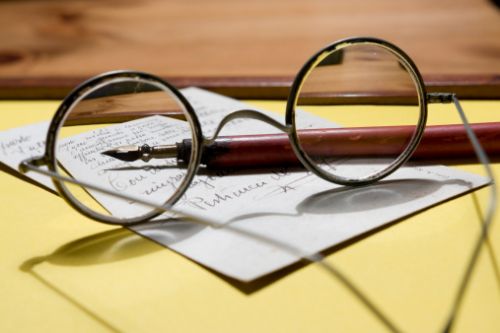
LESSON I. What Is A Poem?A Lesson by Richard🖌 The Seven (7) Basics Of Poetry  I. What Is A Poem? Richard W. Jenkins ©2019 Introduction Some will say poetry is the music of the written word. I would agree and add that like music, poetry has many rhythm forms. In fact, the highly respected James Knapp, English Professor at the University of Pittsburg, explains it like this:
It is my personal contention that one does not have to chose technique over ideas, but that the truly accomplished poet becomes skilled enough that they can utilize both to compose amazingly effective poetry, and in fact, this is the pinnacle of what masterful poetry writing is all about. Though, there are many schools of thought about this and on what a poem is, I'll keep it as basic as possible by saying, "Generally speaking, 'without form and definition', a poem is that which the writer and reader discerns and agrees a poem to be!" And, this can be broken down into an amazingly ineffective, almost endless, array of ambiguous definitions, ideas, opinions, philosophies, etc. –––––––––––––––––––––––––––––––––––––––––––––––––––––––––––––––––––––––– Basically, there are seven (7) widely-recognized and used forms or styles of poetry: 1) Poetic Prose: unrhymed, unmetered, highly expressive, image-laden, deeply meaningful words of imagery, emotion, and metaphor, utilizing highly impressive word arrangements, in normal paragraph, indentions, capitalization, punctuation, etc; this is not Prose (normal talking). 2) Free Verse: unrhymed, highly expressive, image-laden, deeply meaningful words of imagery, emotion, and metaphor, utilizing highly impressive word expression, arranged in unmetered lines and verses, with well-timed line-breaks, grammatically capitalized and punctuated (but, in contemporary writing, this seems to be at the author's sole discretion). 3) Freestyle: intermittently rhymed, highly expressive, image-laden, deeply meaningful words of imagery, emotion, and metaphor, utilizing highly impressive word expression, arranged in unmetered lines and verses, with well-timed line-breaks, grammatically capitalized and punctuated (but, in contemporary writing, this seems to be at the author's sole discretion). 4) Unmetered Rhymed Verse: two (2) or more lines with end rhymes, without a set syllable count or meter, including Rhyming Couplets (2-line verses), Quatrains (4-line verses), Sestets (6-line verses), etc. 5) Metered Rhymed Verse: at least two (2) or more lines with end rhymes, and with a set syllable count/meter, including Rhyming Couplets (2-line verses), Quatrains (4-line verses), Sestets (6-line verses), etc. 6) Metered Unrhymed Verse: one (1) or more unrhymed lines, with a set syllable count/meter, including Blank Verse, Unrhymed Couplets (2-line verses), Quatrains (4-line verses), Sestets (6-line verses), etc. 7) Japanese Poetry: structured, metered, and unrhymed, including the Chōka, Tanka, Renga, Haikai, Renku, Hokku, Senryu, and Haiku, etc. The novice, without benefit of lessons, understanding, and practiced skills in poetic voice, syntax, diction, metaphor, rhythm, flow, line-breaks, imagery, etc; all of the necessary, intricate refinements that magically turn common language into poetry, believes all she or he has to do to compose effective poetry is pick up a pencil and pad and scribble, or sit at the keyboard and type their thoughts, feelings, ideas, emotions … whatever they wish to say, in whatever way they want, or arrange it into some sort of poetic-looking physical format and it's a poem. Most beginners are, by far and large, "innocently" ignorant that poetry is a true art form, and that like any other art form, it is based on and built upon a foundation of principles, rules, disciplines, and skills that define it as poetry, rather than merely fancy and/or appealing talking that many may simply relate to in one way or another. Poetry is portraying the obvious, as-well-as the miraculous, in a completely un-obvious, miraculous way that swoons the mind, romances the heart, sweeps the senses, removes the world, and transports readers to the universe, into the past, the future, or on a journey through their own consciousness in a manner nothing else can … it is painting verbal masterpieces onto the canvas of the mind and into imagination … moving, steering, luring, captivating, enchanting, amazing, etc; the mind's-eye as nothing else ever has, will, or can. This level of power does not happen by accident; nor, is it possible for the unenlightened, uneducated, or misinformed to accomplish … at least, not on the level and to the extent a proficient, practiced, accomplished, and truly skilled poetess or poet can. In addition, many (perhaps, most) novice poets have little or no idea that the soul of poetry is poetic forms, or that poetry even has formats that make poetry poetry. If you're a beginner, seek lessons from a skilled teacher before you develop poor writing habits that will be extremely hard to break, and if you are an experienced writer who lacks in certain skills you need to compose in the way(s) you want to, seek lessons from a skilled teacher … you can never go wrong when you do. So, here we are, prepared for your next new lesson toward being that accomplished poet you always wanted to be: next, "What Is Meter & Why Is It Important?" –––––––––––––––––––––––––––––––––––––––––––––––––––––––––––––––––––––––– Be sure to ask any questions you might have, comment on anything you wish, and/or anything you disagree with … discussion is the heart of learning. And, by all means, leave feedback on what you think, feel, etc. Please, share your thoughts and leave feedback, as this is the only way I know if I've done poorly or well, and I need your input to learn and grow from. Thank you for reading my lessons. (Don't forget to check out my Blogs on poetry.) Anything else you'd like lessons on? Let me know. Comments
|
Stats
724 Views
12 Subscribers Added on April 26, 2019 Last Updated on November 20, 2024
|


 Flag Course
Flag Course